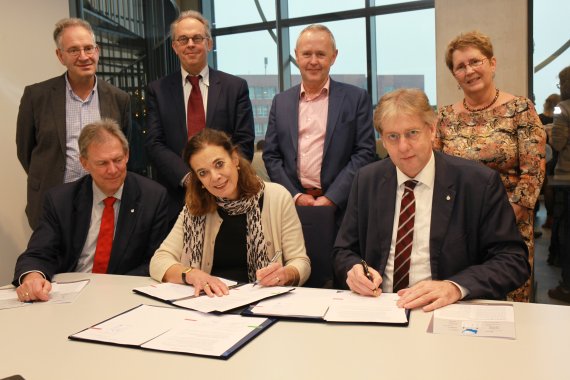<From left to right, front: Han van Krieken, rector magnificus Radboud University; Louise Fresco, President of the Executive Board of Wageningen University & Research; Gerard Meijer, President of the Executive Board of Radboud University. Standing: Raoul Bino, director Agrotechnology & Food Sciences Group, WUR, Peter Hagoort, professor Radboud University, Kees de Graaf, professor WUR and Thea van Kemenade, Radboud University. Photo: Bart de Gouw>
The nutrition and brain researchers at Wageningen and Nijmegen are already cooperating in the NWO project ‘Satisfaction’ in which they investigate the effects of conscious and unconscious eating. ‘We discovered that concentrating on eating makes you feel full sooner,’ says De Graaf. ‘If you eat a packet of crisps in front of the TV, you’ll finish it without noticing. If you sit down to a meal, you’ll feel satiated sooner. The Donders Institute does neurobiological research on what happens in our brain while we focus on the effects of chewing and exposure to flavours.’
Tongue
De Graaf is also working with the Donders Institute in a project funded by the European Regional Development Fund on whether you can taste the energy in your food. That turned out to be the case, says the professor, but only if you chew the food and taste it on your tongue. ‘If that food is on your tongue, you can perceive whether it contains energy. But if you quickly down a soft drink, you won’t get a chance to detect the energy.’
Top of the bill
De Graaf is very satisfied with the collaboration. ‘The Donders Institute is a top act in the field of brain research while we are a leading group in nutrition studies. The collaborative venture will create a strong combination so that we can tackle major research questions.’ The professor has in mind such topics as the design of healthier foods and a food environment that can reduce obesity.
Ten million
The new combination is aiming for a research turnover of ten million euros over the next five years. Two researchers from the two institutes will be working part-time in both Wageningen and Nijmegen. They will supervise PhD candidates exploring research issues at the interface of nutrition, the brain and cognition. De Graaf: ‘We have to generate that turnover ourselves. We will be writing research proposals together for NWO, the EU and the top sectors.’

